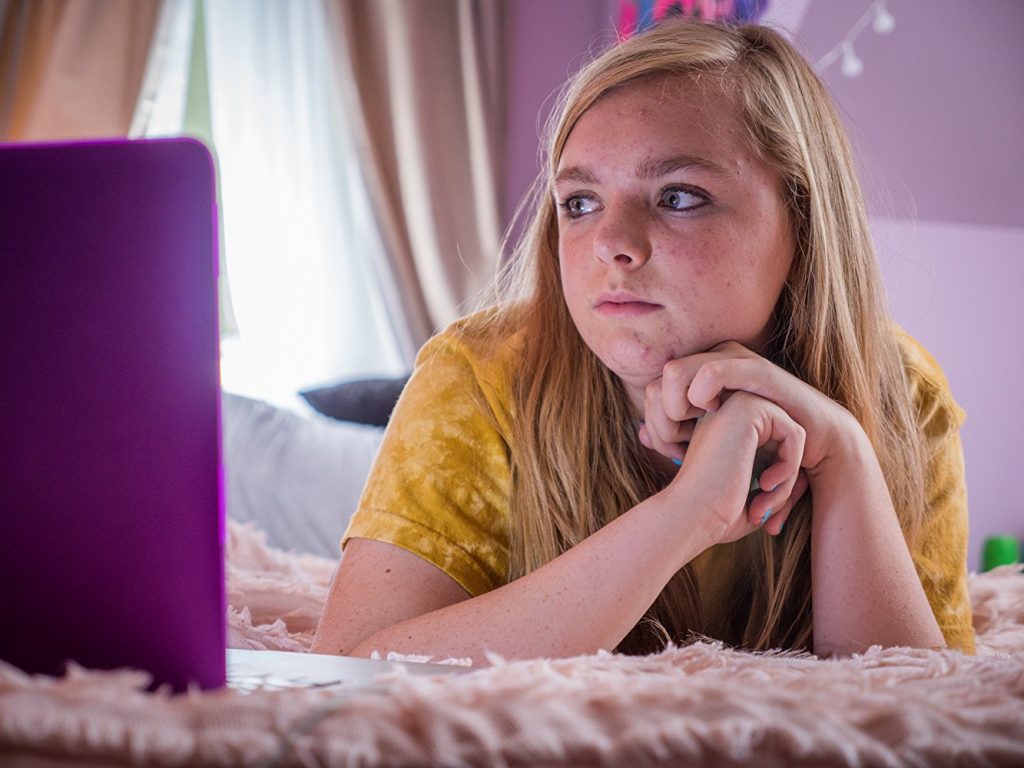There are few more universally awkward times in life than the cusp of adolescence and the transition from middle school to high school. Every human being who goes through eighth grade endures challenges to their emotions and psyche that will shape their eventual lives as adults forever.
The new movie “Eighth Grade” leads viewers through the metaphorical battlefield of that seminal year with an insightful mix of humor and pathos that is simply astonishing. Centered around a soon-to-be legendary performance by young, largely unknown Elsie Fisher (who deserves to be one of the youngest Oscar nominees ever for her acting here), the movie draws viewers completely into the viewpoint of an incredibly awkward girl finding her own inner strength and value for the first time.
The movie follows a girl named Kayla (Elsie Fisher), who is awkward and insecure and somewhat overweight, yet nonetheless makes YouTube videos each day featuring her advice for various aspects of life that almost no one watches. She is obsessed with her cellphone, constantly surfing Facebook and Instagram to “like” other people’s lives and posts, while not having anything or any friends of her own to discuss or share with the world.
The film takes place during Kayla’s last week of eighth grade, as she looks forward to life in high school while at the same time realizing all her hopes for junior high have gone nowhere. This sad truth hits home when her school makes all the students open and contemplate a “time capsule” box they made for themselves upon entering middle school.
Kayla lives only with her father (Josh Hamilton), who briefly mentions that her mom left them when she was a baby. She has a comically high level of sullen silence towards him that subtly breaks his heart, as he tries to be a good and engaged father but is constantly locked out of her thoughts and life.
As she navigates making it through an awkward pool party for a snobbish girl classmate’s birthday, a triumphant day “shadowing”/hanging out with an older high school girl at her future high school, and awkward encounters with boys, Kayla is afraid to discuss her most difficult moments with her father for much of the movie, but somehow manages to make the right moral decisions at each key turn.
Yet rather than leaving the relationship with her father in a state of disrespectful disrepair, writer/director Bo Burnham is trying to set a subtle yet powerfully positive example of parent-teen relations in our tumultuous times. Much like the father in the parable of the prodigal son, Kayla’s dad never gives up, never stops encouraging her, never stops giving her the love she needs to eventually break through and thrive, and when she does finally open up to him, it’s beautifully touching and transformative.
Ultimately, “Eighth Grade” is an intimate look into the mind of an average girl in an era when social media and cellphones have destroyed much of human interaction. It’s funny enough to be classified officially as a comedy, but it’s also very heartfelt and touching in many places and has an almost documentary feel in the way that writer-director Bo Burnham (a star stand-up comedian who became a YouTube star himself as a teen a decade ago and makes his filmmaking debut here) shoots the events.
Interesting techniques abound, as Burnham uses extreme zoom-in shots to put the viewer in the shoes of Kayla at her most awkward moments, and pulls far away at moments that are emotionally devastating, leaving her as alone on screen as she feels inside. The music score is also unique, as composer Anna Meredith veers between barely perceptible keyboard strokes at pensive moments and loud, overbearing keyboard squawks at moments that represent when Kayla is overwhelmed by life.
In one scene, Kayla turns to graphic Internet discussions to better understand a boy’s suggestive inquiry, but ultimately avoids sexual behavior. It should be noted that Burnham mostly conveys this sequence with the utmost possible tact and discretion considering the subject matter, as well as in a tenser scene in which another boy unsuccessfully tries to talk her into removing her shirt in an unexpected and unwanted game of Truth or Dare.
But the most impressive moment of the film comes when Kayla prays innocently and directly to God while lying nervously in bed on the night before she’s visiting high school. This direct expression of faith and hope, rewarded when she has a terrific time, is a refreshing reminder that there are still some filmmakers who respect faith and want to set a positive moral and spiritual example even amid the sexed-up films and TV series that are all too often foisted upon young and impressionable minds.
At a time when much of teen popular culture pushes moral garbage at our youth, “Eighth Grade” overall tries to show that a morally positive lifestyle brings true happiness.


